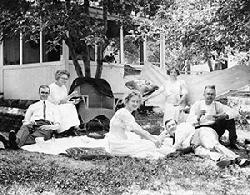 |
| Photo courtesy of Liberty Lake Historical Society |
A group of people enjoy afternoon refreshments along Liberty Lakes Wicomico Beach in this 1913 photo.
|
|
|
|
|
History: Socializing at the lake
2/25/2015 12:44:17 PM
By Ross Schneidmiller
Liberty Lake Historical Society
As the "Killarney" darted over the finish line, young Harold Gallagher (who accompanied his father) unfurled the American flag and the race was won. The silver cup Commodore A. E. Gallagher received for the victory was inscribed with the following: "First prize, Annual Regatta, Liberty Lake, September 10, 1907." It was the first launch regatta to be held at the lake and had been arranged by the summer residents who dwelled in camps and cottages along the lakeshore.
The day of the race, the water was perfect for such an event. Nearly without a ripple, the water was so smooth, the reflection of Big Rock could be seen from the west shore. About an hour before the race, boats belonging to summer residents started to take their positions around the course. People were seen on all sides of the lake waiting for the race to start. As the five launches decked in colorful bunting crossed the starting line, a mighty roar could be heard from the spectators. The betting was spirited among both the men and the women, with most of the wagers being placed on the two favorite boats, the "Killarney" owned by Gallagher and the "Me Too" owned by Raymond Siefert. At the halfway point, the "Killarney" only had a narrow lead over the "Me Too" but started to extend it on the homeward trip. Making the round trip in just 20 minutes over the three-mile course, Gallagher and his boat would have bragging rights over his fellow competitors, who were also his friends and neighbors at the lake.
Rest and relaxation along with recreation may have been the motivation to purchase property at the lake. Advertisements for Wicomico Beach, Liberty Lake's summer colony, promised a break from the demands of society. However, lounging in the hammock with a cool summer breeze soon took a backseat to entertaining family and friends. Liberty Lake's first cottage owners brought the social activities, which they were accustomed to while residing in Spokane's premier neighborhoods like Rockwood and Summit, to the lake.
In 1910, to get better acquainted, the summer residents held a dance. The organizers succeeded in getting exclusive use of the Dance Pavillion at Liberty Lake Park. The largest committee established was for invitations. This most likely was because the invitations were made by hand and would have been passed out in person to all the camps and cottages around the lake. The reception committee included some of the community's longest residents, including Mrs. MacKenzie and Mrs. Kalez who, along with their families, were well known resort operators. Five men were chosen to be floor managers, including Mac Pugh, the residing Spokane County Sheriff who had a place at the lake.
The inside of the Pavillion was decorated for the occasion with streamers of bunting, flags and Japanese lanterns. In addition to cottagers and campers around the lake, invited guests from the city arrived on a special train. Promptly at 8:20 p.m., the dance began with a grand march, where guests promenaded onto and around the dance floor.
Billed as an old-fashioned dance, the program included fiddling favorites like "The Virginia Reel," "Old Dan Tucker" and "Money Musk" for the dancing pleasure of young and old attendees. It was a real family affair.
The dance was a success, and new residents continued to socialize together, often having dinner parties. On Aug. 23, 1910, The Spokane Daily Chronicle described one such party: "Mr. and Mrs. George T. Carr were hosts at one of the jolliest parties of the season at Liberty Lake Friday evening when they entertained a number of campers at Whist and Pit, after which a delicious supper was served. The house was prettily decorated inside with sweet peas, ferns and sunflowers, while Japanese lanterns hung in profusion on the porch and grounds."
Liberty Lake Park, known as Spokane's Inland Seashore, quickly became one of the area's most popular destinations. The band concert held there on July 4, 1910, drew a crowd estimated at 12,000. Those who had established camps or cottages at the lake found themselves at the place to be.
It became common for lake residents to invite guests to spend the day or weekend with them at the lake. These gatherings usually included swimming and boating as well as less strenuous activities like cards. In the evening, they often attended the dances at the Pavillion. If the hosts wanted a night off from cooking for their guests, they could enjoy a fine meal at one of the eateries around the lake. Better yet, at the end of the dance the train service could return their company to Spokane, giving the hosts a chance to return to a quieter, more relaxing cottage. Other times, the night was far from over and they would return to their camp or cottage to enjoy a bonfire on the beach along with refreshments.
Liberty Lake saw a major transformation over the three summers since the railway added a spur line to the lake in June 1907. As the summer residents were closing up their camps and cottages for the season in 1910, they were looking forward to next year at the lake. But first they needed to go home for some rest and relaxation!
Ross Schneidmiller is president of the Liberty Lake Historical Society.
Did you know?
In July 1909, Spokane's latest musical organization, "The Inland Quartet," serenaded various campers and cottagers at Liberty Lake for two hours one evening.
Whist is a classic English trick-taking card game which was widely played in the 18th and 19th centuries.
Pit is a fast-paced card game for three to seven players designed to simulate open outcry bidding for commodities. The game was developed for Parker Brothers and first sold in 1904.
The society pages of Spokane newspapers often told the happenings of Liberty Lake's summer residents.
Camps and cottages often had clever names like "Linger Longer Camp" or "The Seldom Inn."
Advertisement

|
